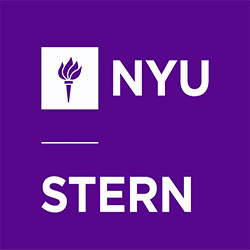 Alina is a current Tech MBA student at Stern. Within Stern, she is part of the Stern Women in Business Club‘s board. Before starting her MBA, Alina gained professional experience in Digital Strategy Consulting at McKinsey in Europe and in multiple roles at Hewlett Packard Enterprise in Germany and Singapore. She holds a BSc in Business Informatics and a MSc in Management.
Alina is a current Tech MBA student at Stern. Within Stern, she is part of the Stern Women in Business Club‘s board. Before starting her MBA, Alina gained professional experience in Digital Strategy Consulting at McKinsey in Europe and in multiple roles at Hewlett Packard Enterprise in Germany and Singapore. She holds a BSc in Business Informatics and a MSc in Management.
How quickly can you bond with 54 other Tech MBAs? Well, apparently it only takes days after meeting them. The first time I got in touch with my classmates was even before the official start of the program. One bold classmate decided to invite all of us over to her building for a party which turned out to be one of the first nights we bonded as a class (see picture below).

Now, the community within our Tech MBA can be described as especially close. Our class profile is made up of 55 individuals with different backgrounds, from over 15 different countries, with between 1-15 years of work experience, different personality types from very introverted to especially extroverted, and with an age difference of more than 12 years between our youngest and oldest class members. Still, we have similar values – we truly embrace Stern’s emphasis on community which is one of the essential reasons why our class climate is especially welcoming and friendly.
To me, the community within the MBA class was an important factor in deciding on a grad school. I came to New York as an international student from Germany with only a very small network in the city. Especially when leaving family and friends behind on a different continent, the strong bond within a class was particularly critical for me. The Tech MBA at NYU Stern was the perfect choice as the MBA community was there for me from Day One. A few highlights have been finding roommates on our class Slack channel, apartment search hacks and personally curated restaurant / bar lists shared with the class from our NYC-based classmates (New Yorker’s equivalent to gold), and finally, that we got to know each other through our Slack channel even before the start of the program.
As we are a small cohort of 55 students, it is possible to get to know your classmates quickly. Additionally, as classes start in the summer semester, it is incredibly effortless to connect within the Stern buildings as it’s only Focused MBAs on campus. During the summer months, we had an intense syllabus with 19.5 credits – but this also allowed us to get to know each other through numerous group projects and more intimate MBA events. Of course, we also got to explore New York City after class and on the weekends.
Besides classes, the community within the Tech MBA offers tremendous support to help prepare for recruiting. As all of us already have strong backgrounds in different industries and roles, we regularly take the time to share our experiences within our classes, and there are even several interview practice groups where classmates help each other with interview prep.
The summer months created a strong bond within the Tech MBA. Besides connecting in class and during group projects, our incredible social committee organizes regular class events as well as a class trip to the Finger Lakes during the summer months.
In the fall, club activities pick up again which will allow us to connect with 2-year MBA students. We get to choose a range of electives and have more space in our syllabus, so this time can be used to connect within the wider Stern network.
For the spring semester, we already have the next class trip planned – this time we will explore the home country of one of our classmates, Colombia!
All those small but valuable things make up the strong community within the Tech MBA as part of the bigger, incredible NYU Stern network. This community made the first months of the program especially fun and helped me to create a home in the city.





